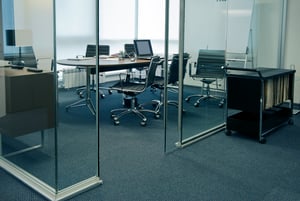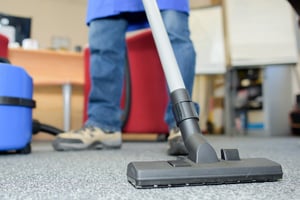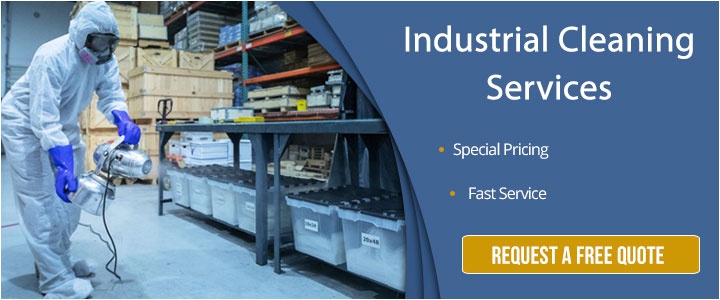Industrial facilities are naturally a place where dirt and grime can accumulate. Between the chemicals often found in manufacturing facilities and the equipment that runs on a routine schedule, routine industrial cleaning is a must.
However, carpeted areas are often overlooked during the routine cleaning process because hard floors like concrete or tile are more common in manufacturing spaces where equipment is located. In fact, unless someone mentions a dirty spot on the floor, their routine upkeep might be overlooked altogether.
In reality, manufacturing facilities are high-traffic areas, and as workers come and go for their shifts, it’s possible that they track dirt and chemicals with them from other areas of the facility.
In lab environments, dirty carpets can be a concern when hygienic conditions are required. As employees come and go from a laboratory, they may track in dirt and other substances from the outside that can contaminate a clean space.
If industrial carpet cleaning isn’t part of your routine industrial cleaning maintenance plan, it’s important to change that. But are industrial cleaning services required to get the job done?
Industrial Carpet Cleaning Vs. Residential Carpet Cleaning
While both industrial and residential carpet cleaning address removing dirt, stains and other products that have accumulated in carpet fibers, there are many differences between the two.
accumulated in carpet fibers, there are many differences between the two.
High-Traffic Vs. Lower-Traffic Areas
Manufacturing spaces are busy, high-traffic areas. Dirt and debris can accumulate very quickly. Although many floors in industrial buildings are hard surfaces, rooms that feature carpeting are often larger in size than a residential home. The amount of time it may take to thoroughly clean the carpeted areas may take longer than the time needed for a residential cleaning company to complete a job at your home.
Heavy Duty Equipment Required
Cleaning commercial carpets may require more heavy duty equipment as well. These could include large cleaning units that attach to a company’s fleet, as well as compact steam cleaning machines.
When Carpet Cleaning Occurs
Another significant difference between the two is WHEN carpet cleaning occurs. In residential homes, carpet cleaning often occurs during normal business hours. In industrial settings, carpet cleaning happens during off-peak times, such as overnight when crews can ensure there is enough time for the carpets to dry before foot traffic resumes the next morning. Industrial carpet cleaning services may even work weekend hours.
Nearby Hazards
Finally, an important distinction between the two involves what industrial carpet cleaning services must work around. In manufacturing facilities, it’s typically hazardous areas.
Factories and plants hold several pieces of heavy duty equipment. These machines require a basic knowledge of how they operate so that industrial cleaning services can avoid hazardous situations. The most experienced industrial cleaning crews have a strong knowledge of how to stay safe in settings that are of higher risk.
It’s important that any industrial carpet cleaning service you hire has the proper insurance and certifications to ensure your workspace remains safe.
How Often You Should Hire Industrial Cleaning Services
One of the most frequently asked questions is how often an industrial or manufacturing facility should hire industrial cleaning services for their carpeted areas. That depends.
How often carpets should be cleaned depends on the amount of traffic they receive and to what level they are soiled. A high-traffic lobby in the building may require a greater degree of service if your goal is to keep the carpet looking fresh and clean. Low-traffic areas may only require professional cleaning once or twice a year.
If your facility has cleanliness requirements that can impact your manufacturing process, you may be more likely to employ industrial cleaning services for carpeted rooms to ensure you maintain the appropriate standards.
How Industrial Carpets Are Cleaned
Which method you choose to achieve clean carpets often boils down to your facility’s needs. 
For example, steam cleaning or hot water extraction is one of the most common types of carpet cleaning used in both residential and commercial settings. During this process, hot water at high pressure and a cleaning agent are used to penetrate the carpet fibers. This breaks down the dirt and bacteria that have soiled the carpet. Workers then use a vacuum cleaner to extract the hot water. This extractor process can be long in large commercial areas, and likely requires drying overnight.
On the other hand, dry carpet cleaning uses an absorbent compound that binds to dirt. Carpet cleaners then use a mechanical brush to disrupt the dirty fibers. Eventually, the dirt separates from the fibers, and workers vacuum up the dirt with a professional strength vacuum. This is a good option for facilities that work around the clock and want to avoid wet carpets.
Another option is carpet shampooing, but like steam cleaning, this process requires a drying time. This heavy-duty approach involves applying a foaming substance to carpets and using a brush machine to work the substance into the fibers. Workers then wet vacuum the area to remove the shampoo and any dirt attached.
Other options include bonnet cleaning, which uses a spinning pad soaked in cleaning solution to polish the carpet’s surface, and encapsulation, which uses synthetic foam detergents and a brush machine to remove dirt. With encapsulation, the synthetic foam detergent crystallizes into powder, encapsulating the soil. A worker can then vacuum the powder up, removing any residue from the process. Both of these are used to “spruce up” the appearance of carpet, but are not as effective at deep cleaning heavily soiled areas.
What to Look For In Industrial Carpet Cleaning Services
Industrial cleaning is an investment in your business, which is why it’s critical to work with the best. When choosing an industrial or commercial cleaner to work with, it’s important to ensure it is experienced in operating in the same type of environment as your facility. As we mentioned above, manufacturing spaces often include hazardous working conditions, so it’s critical that cleaning crews are knowledgeable about any risks present.
Top industrial cleaning companies also recognize that you have tight deadlines and that shutting down operations could be costly. These companies have the tools to both quickly and thoroughly clean carpeted areas while working with your production schedule to minimize disruptions.
Finally, experienced industrial cleaning companies know the value of offering a walk-through program, especially if you have hazardous waste on the property. Consultative in nature, a walk-through program involves the cleaning company touring your facility, allowing these industry experts to take notes, discuss your concerns and identify any problem areas along the way.
They should be able to advise you on any other cleaning considerations you have as well, whether it’s information on upholstery cleaning, industrial tank cleaning or even hazardous waste removal as a result of the cleaning process.
The industrial carpet cleaning team you choose should be a partner in making sure your facility is a direct reflection of the pride you take in operating it.


Comment